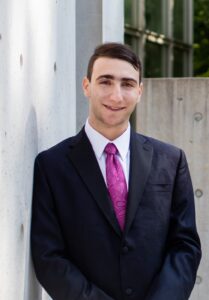
About the Piece
Program Note:
Shubho Lhaw Qolo means “glory to the voice” in Aramaic, the language spoken by Jesus Christ. The music is inspired by an adapted text of St. Ephrem the Syriac who lived in the fourth century. Modern settings of the text are commonly sung by Christian communities in both Aramaic and Arabic around Christmas season throughout the Middle-East.
One of the great mysteries and powers of music is that it can leave us feeling that musical time transcends clock time. Shubho Lhaw Qolo explores notions of timelessness as well as concurrent temporalities and directionalities. The notation reflects the superimposed, independent temporalities which operate at once in the music, thus barlines are not always shared by all instruments. The music moves from metered to unmetered in an organic manner so as not to be audible. The different time-layers integrate and interact with one another throughout the music, just as the different playing techniques do. Throughout the piece, different sounds come in and out of focus; textures, like colors, bleed into each other. The soloist and the orchestra operate on different and independent sonic universes at the beginning, however, as the piece progresses, they approach integration right up to the final cadence where they finally commune. The conclusion of the piece comes with my own re-harmonization of the classic “Amen”. [Program note by the composer]
Instrumentation:
Harp
Two Percussionists including:
Percussion 1: Triangle, Glockenspiel, Vibraphone, any two or three Timpani, two large Cymbals
Percussion 2: Tam-tam, Glockenspiel, Vibraphone, any two Timpani, two large Cymbals
Two Violins
Two Violas, including the soloist -Two Cellos
Doublebass
Score Preview:
Click HERE for a perusal score
About the Composer
Sami Seif (b. 1998) is a Lebanese composer, music theorist and pianist. His music is inspired by the aesthetics, philosophies, paradigms and poetry of his Middle-Eastern heritage. His work has been described as “very tasteful and flavorful” with “beautiful, sensitive writing!” (Webster University Young Composers Competition). His latest musical concerns center around the phenomenology of time and of differing degrees of focus.
Seif’s music has been performed by such renowned artists as Mary Kay Fink and Stanley Konopka of The Cleveland Orchestra and has won a number of prizes from such institutions as ASCAP, SOCAN, the Stamford Music and Arts Academy, the Foundation for Modern Music, the Ohio Federation of Music Clubs, the Cleveland Composer’s Guild, Webster University, the Arizona Flute Society, Abundant Silence, and Warren County Summer Music School, among others. Additionally, he was selected as a finalist for the 2019 Kaleidoscope Chamber Orchestra call for scores from a pool of more than 2200 applicants from more than 90 countries. In 2020, he was selected again from a larger pool of almost 8000 applicants.
Originally from the small town of Ashkout in Mount Lebanon, he was born in Abu Dhabi and is fluent in Arabic, French and English. He started at the age of twelve as a self-taught musician, composing and playing keyboard instruments. He then started formal musical training in piano, composition, audio engineering and sound synthesis. Later, he moved to Toronto and studied composition with Roger Bergs.
Seif completed his BM in composition and music theory at the Cleveland Institute of Music where he studied composition with Keith Fitch, piano with Gerardo Teissonnière and music theory with Alan Reese. At CIM, he earned the Donald Erb prize in composition and the Beth Pearce Nelson award in music theory. His music theory thesis is titled How Time Passes: Some Thoughts on Musical Time, and is an inquiry on the manipulation of time perception brought about by music. Additionally, he has taken masterclasses with such renowned composers as Stephen Hartke, Andrew Norman and Melinda Wagner. Upcoming performances of his work can be heard at the 2022 Sewanee Summer Music Festival, by the Odin Quartet in Canada, as well a premiere by Mary Kay Fink and Dylan Moffitt.
Performance Materials
Performance materials are available directly from the composer:
Click HERE